
Research Article
Austin J Womens Health. 2024; 10(1): 1066.
Prevalence of Chronic Diseases in Immigrant and Native-Born Women in Spain During Pregnancy. A Retrospective, Observational Study
Júlia Siscart1-3*; Laura Gascó4; M Catalina Serna1,2,5; Míriam Orós1,2; Daniel Perejón1,2,6; Josep Maria Jiménez Ramos7; Blanca Salinas1
1School of Medicine, Lleida University, Lleida, Spain Universitat de Lleida, Lleida, Spain
2Institut d’Investigació en Atenció Primària IDIAP Jordi Gol, Catalan Institute of Health, Lleida, Espanya
3Primary Care Centre Seròs, Catalan Institute of Health, Seròs, Spain
4Primary Care Centre 11 de Setembre, Catalan Institute of Health, Lleida, Spain
5Primary Care Centre Eixample, Catalan Institute of Health, Lleida, Spain
6Primary Health Center Cervera, Catalan Institute of Health, Lleida, Spain
7Primary Health Center Rambla Ferran, Catalan Institute of Health, Lleida, Spain
*Corresponding author: Júlia Siscart Viladegut Seròs Primary Care Center. Institut Català de la Salut (ICS) Avda. Ricard Viñes, 8. 25183 Seròs, Spain. Email: jvsiscart.lleida.ics@gencat.cat
Received: January 26, 2024 Accepted: March 04, 2024 Published: March 11, 2024
Abstract
Background: Immigration has become a social concern due to the faster increasing proportion of international migrants. Health status in migrant people declines with increased length of stay in the host country and women have higher morbidity. Comorbidities in pregnancy are frequent and that they carry risks in the newborn, the objective of this study is to determine their prevalence according to the different ethnic groups.
Methods: We performed a retrospective observational cohort study in pregnant women between 2012 and 2018 in the Lleida health region. Comorbidity in pregnancy was collected and compared between immigrants and Spanish. The risk of comorbidity was calculated using univariate and multivariate logistic regression analysis with adjustment for the variables included in the descriptive analysis.
Results: We analyzed a sample of 17177 pregnant women representing the 86% of the total of pregnant women in the health region of Lleida. The highest percentage of women come from West Europe (63%) and the lower percentage from Asia and the Middle East (1,4%). Besides, Eastern Europe women were the younger (medium age 29,7 years old) while the older were from West Europe (medium age 30,9 years old).
Sub Saharan Africa women have the highest prevalence of hypertension (7%), furthermore, the prevalence of diabetes mellitus and obesity was observed in these women together with Maghreb’s women.
The multivariate model according to country of origin compared with autochthonous population (West Europe) shows an increased risk of overweight and obesity in Sub Saharan, Maghreb, and Latin America population. Asian and the Middle East and Maghreb women had a higher risk of diabetes mellitus while being from Latin America and Eastern Europe has a protective effect for this disease. Only Sub-Saharan Africa women have increased risk of hypertension. Finally Sub-Saharan Africa, Asian and the Middle East and Maghreb had lower risk of depression compared with autochthonous population.
Conclusions: The immigrant population generally presents a higher risk of diabetes, overweight/obesity, and hypertension compared to the native population; however, there are variations in risk depending on the country of origin.
Introduction
Immigration has become a social concern due to the faster increasing proportion of international migrants. From 2010 to 2019 we have seen an increase of 23,1% which represents 272 million of migrants in the world. Europe hosts the largest number of international migrants (82 million), the second is Northern America (59 million) and third Northern Africa and Western Asia (49 million) [1].
In Spain, immigration represents up to 14,4% of the population [2]. During 2019, in Catalonia, 15% more immigrants settled compared to 2018, which represents 203.843 people from outside of Spain. Almost 42% of this population come from America (both Northern and Southern America), 15% come from European Union and around 13% from Africa, and only 10% come from Asia and Oceania [3].
Migrants often encounter linguistic, social, political, and economic barriers, which have been reported to reduce access to health systems and increase morbidity [4-6]. The experiences and health status of the migrant population vary by sex. Although many studies of migrant population have confirmed that within migrant population health status is better at arrival rapidly declines with increased length of stay in the host country [7]. In addition, women have higher morbidity and worse perceived health than men, and a more rapid loss of quality of life once in the host country [8-13].
Some studies reported a higher prevalence of obstetrical and perinatal problems in immigrant women when compared with native residents [14-16]. Even so, there are still controversies about how immigration can affect the state of maternal and fetal health.
Knowing that diseases such as diabetes mellitus and hypertension are frequent and that they carry risks in the newborn, the objective of this study is to determine their prevalence according to the different ethnic groups to influence their prevention and follow-up.
Material and Methods
Study Design and Data Collection
We conducted a retrospective observational cohort study among pregnant women in the health region of Lleida during the years 2012-2018.
The data of women who had given birth at the Arnau de Vilanova Hospital between January 1, 2012 and December 31, 2018 were obtained through the CMBD database ("Conjunt Minim de Base de Dades"). In particular, the data of all the eligible patients assigned to a primary care unit derived from the computerized clinical history database E-CAP of the Catalan Health Institute; and data from Social Security prescriptions derived from the database of the Servei Català de Salut.
This article is part of the Iler Pregnancy project, retrospective cohort study conducted in Lleida with the aim of evaluating the prevalence of chronic pathologies in pregnancy (hypothyroidism, depression, diabetes mellitus and obesity) and therapeutic adherence to prescribed drugs [17-21].
Study Population
Women who have had a birth at the Arnau de Vilanova University Hospital in Lleida between January 1st, 2012 and December 31st, 2018 were included in the study. Women who did not belong to Lleida health region were excluded. To evaluate the representativeness of the sample, we calculated the percentage of pregnant women studied compared to the total of pregnant women in the health region of Lleida. Data were obtained from the database of the "Instituto Statistics of Catalonia” (Idescat) (Table 1). We included data from the date of the last period to the date of delivery.
Year
Deliveries in our
sampleDeliveries from
IdescatSample/Idescat
2012
3635
3788
96%
2013
3370
3535
95%
2014
3308
3592
92%
2015
3162
3426
92%
2016
3180
3283
97%
2017
3034
3197
95%
2018
3001
3029
99%
Table 1: Number of births registered in our sample in comparison to the Lleida health region per years.
The following variables were recorded: region of origin (Sub Saharan Africa, Latin America, Asia and the Middle East, West Europe, Eastern Europe, and Maghreb) (19); body mass index (BMI) which is classified according to low weigh (BMI under
18.5 Kg/m2), overweigh (BMI between 25 to 29.9) and obesity (IMC more than 30); number of pregnancy and twin pregnancy; risk during pregnancy; diabetes and mellitus (code O24.9 at CIE-10.); arterial hypertension (code I10-I16 at l’ICD-10); dyslipidemia (code E78 at l’ICD-10) and depression (codes F32.0-F32.9, F33.0-F33.3, F33.8, F33.9, F34.1, or F41.2 at l’ICD-10).
Data Analysis
We performed a descriptive analysis. Numerical variables were described by mean and standard deviation, and categorical variables by absolute and relative frequencies. Differences between groups were evaluated using Student's t-test or Chi-square test, depending on whether the variables were numerical or categorical, respectively. The relationship between hypothyroidism and other variables was analyzed using multivariate logistic regressions and adjusted Odds Ratio (OR) and the respective 95% Confidence Intervals (CI) were reported.
Ethical Aspects
This study was approved by the ethics and clinical research committee at the Institut d’Investigació IDIAP Jordi Gol under the code 19/195-P and carried out in accordance with the principles of the Declaration of Helsinki. Information was obtained from electronic medical records stored in the centralized ECAP database and extracted by the Department of Healthcare Evaluation and Research Management. Therefore, it was not necessary to ask participants for their informed consent. The variables in the ECAP database were processed anonymously and with full confidentiality guarantees as established by national law and Regulation 2016/679 of the European Parliament and of the Council on the protection of natural people regarding the processing of personal data, and to the free movement of such data.
Results
We started with a sample of 21375 women who had given birth at the Arnau de Vilanova Hospital in Lleida between 2012 and 2018 (both included). Of this sample 1625 were excluded because they did not have a personal identification code (CIP), and 2573 because multiple data from the clinical history were missing. The final sample included 17177 patients (Figure 1).
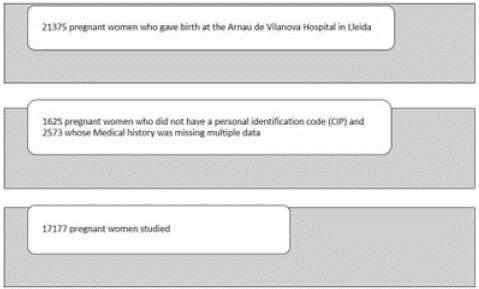
Figure 1: Sample of pregnant women studied.
The population distribution according to the region of origin was Sub Saharan Africa (5,6%), Latin America (4,8), Asia and the Middle East (1,4%), West Europe (63%), Eastern Europe (10,3%), and Maghreb (14,9%). There was a similar percentage in the different years of study (Table 2). The lower age was observed on Eastern Europe women (29,7 years old) and women from the West Europe were the oldest (medium age 30,9 years old). The BMI was higher between Sub Saharan Africa pregnant women. According to pregnancy number the most part of the sample was on the first or the second pregnant process. Almost 50% of the patients do not present any risk of pregnancy except the Sub-Saharan Africa women where only 37,9% were free of risk (Table 3).
Sub Saharan Africa
Latin
AmericaAsia and the
Middle EastWest Europe
Eastern
EuropeMaghreb
2012
118(14%)
131(18,3%)
49(22,1%)
1436(15,2%)
216(14,1%)
377(16,9%)
2013
115(13,7%)
117(16,3%9
29(13,1%)
1409(14,4%)
196(12,8%)
291(13%)
2014
113(13,5%)
103(14,4%)
21(9,5%)
143(15,2%)
230(15%)
308(13,8%)
2015
116(12,6%)
85(11,9%)
30(13,5%)
1388(14,7%)
220(14,4%)
312(14%)
2016
106(12,6%)
105(14,6%)
33(14,9%)
1309(13,8%)
225(14,7%)
339(15,2%)
2017
132(15,7%)
94(13,1%)
33(14,9%)
1273(13,5%)
238(15,5%)
291(13%)
2018
140(16,7%)
82(11,4%)
27(12,2%)
1208(12,8%)
208(13,6%)
315(14,1%)
Table 2: Distribution by years according to region of origin.
Sub Saharan Africa
Latin America
Asia and the Middle East
West Europe
Eastern Europe
Maghreb
Valor p
Age
30,6(5,8%)
29,5(6,4%)
29,1(5,8%)
30,9(5,7%)
28,7(5,6%)
29,8(5,7%)
<0,001
Body Mass Index
26,9(5,8%)
25,2(4,8%)
24(4,2%)
24,2(4,9%)
24,1(4,4%)
27,2(4,7%)
<0,001
Pregnancy Number
<0,001
> 4
70(8,3%)
15(2,1%)
7 (3,2%)
169(1,8%)
19(1,2%)
98(4,4%)
1
336(40%)
436(60,8%)
108(48,6%)
5313(56,2%)
899(58,6%)
766(34,3%)
2
239(28,5%)
182(25,4%)
74(33,3%)
2896(30,6%)
455(29,7%)
735(32,9%)
3
136(16,2%)
63(8,8%)
26(11,7%)
830(8,8%)
126(8,2%)
451(20,2%)
4
59(7,0%)
21(2,9%)
7 (3,2%)
253(2,7%)
34(2,2%)
183(8,2%)
Twin Pregnancy
1,000
No
840(100%)
717(100%)
222(100%)
9460(100,0%)
1533(100%)
2233(100%)
Yes
0(0,0%)
0 (0,0%)
0 (0,0%)
1(0,01%)
0 (0,0%)
0 (0,0%)
Risk of Pregnancy
<0,001
High risk
208(27,5%)
140(21,3%)
42(23%)
1483(17,4%)
205(14,4%)
381(19,2%)
Medium risk
240(31,7%)
170(26%)
50(27,3%)
2561(30%)
386(29%)
553(27,8%)
Very high risk
22(3%)
12(1,8%)
0 (0,0%)
173(2%)
15(1,1%)
23(1,2%)
Risk free
287(37,9%)
335(51%)
91(49,7%)
4322(50,6%)
724(54,4%)
1029(51,8%)
Table 3: Distribution according to characteristics of pregnant women.
Table 4 shows a distribution of chronic disease according to region of origin. On the one hand, is observed than 7% of Sub-Saharan Africa women have hypertension compared the 1,2% of Asia and the Middle East women. On the other hand, 14,4% of this woman present diabetes mellitus, being the ones with the highest prevalence along with the maghribs women. A lower prevalence of dyslipidemia was observed on Asia and the Middle East women but this was not statistically significant. Finally, the highest prevalence of obesity was observed on the African woman (both Sub Saharan and Maghreb).
Sub Saharan Africa
Latin America
Asia and the Middle East
West Europe
Eastern Europe
Maghreb
Valor p
Hypertension
<0,001
No
781(93%)
697(97,2%)
215(96,8%)
9268(98%)
1506(98,2%)
2188(98%)
Yes
59(7,0%)
20(2,8%)
7(1,2%)
193(2,0%)
27(1,8%)
45(2,0%)
Mellitus Diabetes 2
<0,001
No
768(91,4%)
673(93,9%)
190(85,6%)
8683(91,8%)
1431(93,3%)
1971(88,3%)
Yes
72(8,57%)
44(6,14%)
32(14,4%)
778(8,22)
102(6,65)
262(11,7%)
Hypothyroidism
<0,001
No
822(97,9%)
668(93,2%)
203(91,4%)
8768(92,7%)
1451(94,7%)
2124(95,1%)
Yes
18(2,1%)
49(6,8%)
19(8,6%)
693(7,3%)
82(5,4%)
109(4,9%)
Dyslipidemia
0,148
No
829(98,7%)
705(98,3%)
221(99,5%)
9359(98,9%)
1521(99,2%)
2218(99,3%)
Yes
11(1,31%)
12(1,67%)
1(0,45%)
102(1,08%)
12(0,78%)
15(0,67%)
Depression
<0,001
No
883(99,2%)
698(97,4%)
221(99,5%)
9186(97,1%)
1497(97,7%)
2198(98,4%)
Yes
7(0,83%)
19(2,65%)
1(0,45%)
275(2,91%)
36(2,35%)
35(1,57%)
Obesity
<0,01
No
609(74,7%)
607(85,3%)
197(91,6%)
8192(88,1%)
1364(90,3%)
1620(74,2%)
Yes
(25,3%)
105(14,7%)
18(8,4%)
1103(11,9%)
146(9,7%)
563(25,8%)
Table 4: Prevalence of chronic diseases according to region of origin.
The multivariate model according to country of origin compared with autochthonous population (West Europe) shows and increased risk of overweight and obesity in Sub Saharan (OR 2,79, 95% CI 2,35-3,30), Maghreb (OR 3,71, 95% CI 3,33-4,15), and Latin America population (OR 1,43, 95CI 1,20-1,71). Asian and the Middle East (OR 1,88, 95% CI 1,26-1,71) and Maghreb (OR 1,48, 95% CI 1,28-1,72) women had a higher risk of diabetes mellitus while being from Latin America (OR 0,73, 95% CI 0,53-0,99) and Eastern Europe (OR 0,80, 95% CI 0,63-0,98) has a protective effect for this disease. Finally Sub-Saharan Africa (OR 0,28, 95% CI 0,12-0,55), Asian and the Middle East (OR 0,15, 95% CI 0,01-0,67) and Maghreb (OR 0,53, 95% CI 0,37-0,75) had lower risk of depression compared with autochthonous population. All this difference were statistically significant (Figures 2-6).
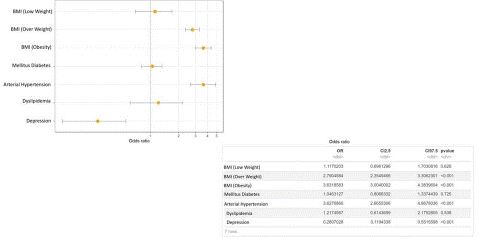
Figure 2: Multivariate model according to Sub-Saharan Africa origin compared with autochthonous population.
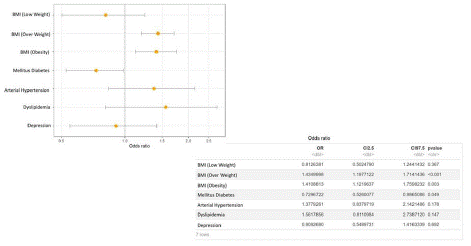
Figure 3: Multivariate model according to Latin America Origin compared with autochthonous population.
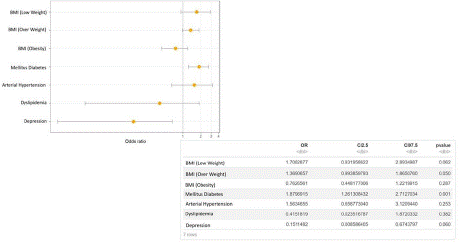
Figure 4: Multivariate model according to Asian and the Middle East origin compared with autochthonous population.
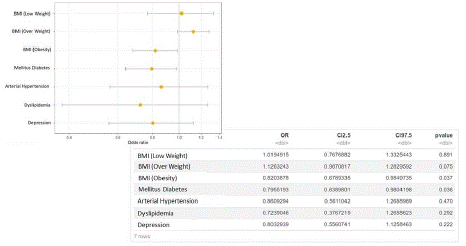
Figure 5: Multivariate model according to Eastern Europe origin compared with autochthonous population.
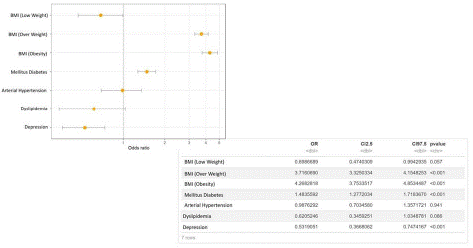
Figure 6: Multivariate model according to Maghreb origin compared with autochthonous population.
Discussion
We analyzed a sample of 17177 pregnant women representing the 86% of the total of pregnant women in the health region of Lleida. The highest percentage of women come from West Europe and the lower percentage from Asia and the Middle East. Besides, Eastern Europe women were the younger while the older were from West Europe.
Sub Saharan Africa women have the highest prevalence of hypertension, furthermore, the prevalence of diabetes mellitus and obesity was observed in these women together with Maghreb’s women.
The multivariate model according to country of origin compared with autochthonous population (West Europe) shows an increased risk of overweight and obesity in Sub Saharan, Maghreb, and Latin America population. Asian and the Middle East and Maghreb women had a higher risk of diabetes mellitus while being from Latin America and Eastern Europe has a protective effect for this disease. Only Sub-Saharan Africa women have increased risk of hypertension. Finally Sub-Saharan Africa, Asian and the Middle East and Maghreb had lower risk of depression compared with autochthonous population.
In our study the sub-Saharan Africa women present more comorbidity than other population, Brown et al. study, carried out in 2020 and which analyzes the risk of severe maternal morbidity among 1.280.925 delivery hospitalizations among women of different races, also confirms that deliveries among black women had a rate of maternal morbidity of 225,7 per 10.00 compared to 104,7 per 10.000 white women (OR 2,2, 95% CI 2,1-2,3). Brown et al. also demonstrates that 7% of black women had three or more comorbidities, compared to 4% of white women, 4% of Hispanic women and 3% of Asian women, this fact is also observed in our study, where African women (both sub-Saharan and Maghreb women) have a higher prevalence of obesity, hypertension, and diabetes mellitus [22].
Admon et al. [23] shows in his study that women with multiple chronic conditions have 3.8 times the rate of severe maternal morbidity and mortality compared to women without chronic conditions. In our study, Sub-Saharan women have more prevalence of comorbidities than other women and have more risk in pregnancy, almost 50% of the patients do not present any risk of pregnancy except the Sub-Saharan Africa women where only 37,9% were free of risk.
Furthermore, Metcalfe et al. developed a study in USA from 1993 to 2012, which concluded that women of minority race and ethnicity are at a higher risk of having chronic conditions during pregnancy, despite an overall increase in rates of chronic conditions among all pregnant women, with the difference in prevalence of one or more pre-existing comorbid conditions for black women (9,9%) nearly twice that of white women (5,6%) [24].
In a parallel line of research, other studies like Shah et al. one [25,26], has shown that Asian populations develop type 2 diabetes, gestational diabetes, and lower body mass index values than Europeans, which agrees with our study where being from Asia and de Middle East have a protector effect to develop diabetes mellitus. Similar results were observed in a study carried out in France [27], where they observed that women from North Africa and Turkey had a higher risk of overweight and gestational diabetes mellitus, while women from Eastern Europe and Asia had a lower risk of that; in addition, Sub-Saharan Africa had a higher risk of being overweight or obese pre pregnancy, these data are also consistent with those observed in our work.
Regarding arterial hypertension, Bastola et al. [28] carried out a study with women of Finnish origin and they conclude that the risk for any hypertensive disorders of pregnancy after adjustment for confounders was lower for women of migrant origin, with an exception for women of Sub-Saharan African origin. Knutzen et al. [29], also demonstrated the prevalence of chronic hypertension was higher in black (1,1%) and colored (1,7%) women compared to white women (0,6%). All these data are similar in our analysis, sub-Saharan African women show more risk than the rest of the groups.
Finally, Sajuan et al. [30] found racial and ethnic differences in perinatal depression, on the one hand, Asian individuals had lower risk of perinatal depression and anxiety but higher risk of moderate/severe depression during pregnancy compared to Non-Hispanic White individuals; on the other hand, Non-Hispanic Black individuals had higher risk of perinatal depression, comorbid depression/anxiety, and moderate/severe and severe depression.
They also concluded that Hispanic individuals had lower risk of depression during pregnancy and perinatal anxiety but higher risk of postpartum depression and moderate/severe and severe depression during and after pregnancy. Besides, Shakeel et al. [31], who carried out a study in Oslo, reported that women from de Middle Easterners (mainly from Iraq, Iran, and Turkey) and South Asians (mainly from Pakistan and Sri Lanka) had significantly higher risk for depression than other minorities and Western Europeans in logistic regression models, OR 2,81; 95% CI 1,29-6,15 and OR 2,72, 95% CI 1,35-5,48 respectably. The methodological differences present in these studies, in which a screening of pregnant women is carried out, compared to our study that analyses diagnostic codes may justify these differences. A lower prevalence found in our study may be attributed to a lack of addressing the mental health of patients in medical consultations.
Difficulties and Limitations of the Study
We must point out possible limitations. First, we have not assessed the socioeconomic data that may influence health outcomes; on the other hand, the population groups analysed have been grouped into large groups and may not be homogeneous in their composition. This fact can make correct identification as a risk group difficult.
Conclusions
The immigrant population generally presents a higher risk of diabetes, overweight/obesity, and hypertension compared to the native population; however, there are variations in risk depending on the country of origin. These data suggest that the immigrant population from these regions can benefit from medical follow-up that addresses their needs.
Future research should include data on country of origin and examine the role of premigration and postmigration factors in developing chronic diseases and its associated short- and long- term outcomes
Author Statements
Acknowledgments
The authors would like to acknowledge Dr. Miquel Butí for his valuable contribution and support to design and create the database, Joaquim Sol for his contribution to the statistics analysis, and the Gol i Gurina Foundation.
Funding
The authors declare support from PICARD 2023 subvention from Diputació de Lleida/ IDIAP Jordi Gol and Institut Catala de la Salut Lleida. The recipient is Júlia Siscart Viladegut and the grant number is 4R23/338. The funders had no role in study design, data collection and analysis, decision to publish, or preparation of the manuscript. The authors received no specific funding for this work.
Ethics Declarations
This study was approved by the ethics and clinical research committee of the “Institute for Primary Health Care Research Jordi Gol i Gurina (IDIAPJGol)” under the code 19/195-P. The study was conducted in accordance with the principles of the Declaration of Helsinki. Pseudonymized retrospective descriptive cross-sectional study according to Additional Provision 17.2.d LOPD-GDD for research purposes, without the need to obtain the consent of the data holders, there is a technical and functional distance between the research team and the performer pseudonymization, and that the data is only accessible to the research team, and technical measures have been taken to prevent such re-identification and access by third parties through the CMBD database (“Conjunt Minim de Base de Dades”) the E-CAP computerized medical history database and the Catalan Health Service database.
Competing Interests
The authors declare they have no competing interests.
Contributions
JS and LG conceptualized the study, analyzed the data, and wrote the first draft of the manuscript; MCS, MO, DP and JMJ contributed to the design of the study, data management, and manuscript development and review; BS also contributed to the design of the study, and to the creation of data bases and data analysis. All authors read and approved the final manuscript.
Ethical Aspects
This study was approved by the ethics and clinical research committee at the Institut d’Investigació IDIAP Jordi Gol under the code 19/195-P and conducted in accordance with the principles of the Declaration of Helsinki. Information was obtained from electronic medical records stored in the centralized ECAP database and extracted by the Department of Healthcare Evaluation and Research Management. Accordingly, it was not necessary to ask participants for their informed consent. The variables in the ECAP database were processed anonymously and with full confidentiality guarantees as established by national law and Regulation 2016/679 of the European Parliament and of the Council on the protection of natural persons with regard to the processing of personal data, and to the free movement of such data.
References
- United Nations Department of Economic and Social Affairs. Internal Migrants Stock [Internet]. Nueva York: UN DESA. 2019.
- Portal de inmigración. Observatorio Permanente de la Inmigración. Estadísticas. 2019.
- Catalonia welcomed more immigrants than ever in 2019, Catalan News. CAN/Barcelona. 2020.
- SanSantiago Mda C, Figueiredo MH. Immigrant women’s perspective on prenatal and postpartum care: systematic review. J Immigr Minor Health. 2015; 17: 276-84.
- Almeida LM, Caldas J, Ayres-de-Campos D, Salcedo-Barrientos D, Dias S. Maternal healthcare in migrants: a systematic review. Matern Child Health J. 2013; 17: 1346-54.
- Chu DM, Aagaard J, Levitt R, Whitham M, Mastrobattista J, Rac M, Eppes C, Gandhi M, Belfort MA, Aagaard KM. Cohort Analysis of Immigrant Rhetoric on Timely and Regular Access of Prenatal Care. Obstet Gynecol. 2019; 133: 117-128.
- Gimeno-Feliu LA, Pastor-Sanz M, Poblador-Plou B, Calderón-Larrañaga A, Díaz E, Prados-Torres A. Multimorbidity and chronic diseases among undocumented migrants: evidence to contradict the myths. Int J Equity Health. 2020; 19: 113.
- Llácer A, Zunzunegui MV, del Amo J, Mazarrasa L, Bolumar F. The contribution of a gender perspective to the understanding of migrants’ health. J Epidemiol Community Health. 2007; 61: ii4-10.
- Malmusi D, Borrell C, Benach J. Migration-related health inequalities: showing the complex interactions between gender, social class and place of origin. Soc Sci Med. 2010; 71: 1610-9.
- Nielsen SS, Krasnik A. Poorer self-perceived health among migrants and ethnic minorities versus the majority population in Europe: a systematic review. Int J Public Health. 2010; 55: 357-371.
- Toselli S, Gualdi-Russo E, Marzouk D, Sundquist J, Sundquist K. Psychosocial health among immigrants in central and southern Europe. Eur J Public Health. 2014; 24: 26-30.
- Nuñez L. Migration, gender and health. Handbook on gender and health. 2016; 251-267.
- Spitzer D. Engendered movements: migration, gender and health in a globalized world. Handbook on gender and health. 223-234.
- Behboudi-Gandevani S, Bidhendi-Yarandi R, Panahi MH, Mardani A, Prinds C, Vaismoradi M. Perinatal and Neonatal Outcomes in Immigrants From Conflict-Zone Countries: A Systematic Review and Meta-Analysis of Observational Studies. Front PublicHealth. 2022; 10: 766943.
- Behboudi-Gandevani S, Bidhendi-Yarandi R, Panahi MH, Mardani A, GåreKymre I, Paal P, Vaismoradi M. A Systematic Review and Meta-Analysis of the Risk of Stillbirth, Perinatal and Neonatal Mortality in Immigrant Women. Int J Public Health. 2022; 67: 1604479.
- Gieles NC, Tankink JB, van Midde M, Düker J, van der Lans P, Wessels CM, Bloemenkamp KWM, Bonsel G, van den Akker T, Goosen S, Rijken MJ, Browne JL. Maternal and perinatal outcomes of asylum seekers and undocumented migrants in Europe: a systematic review. Eur J Public Health. 2019; 29: 714-723.
- Orós M, Siscart J, Perejón D, Serna MC, Godoy P, Salinas-Roca B. Ethnic Disparities and Obesity Risk Factors in Pregnant Women: A Retrospective Observational Cohort Study. Nutrients. 2023; 15: 926.
- Siscart J, Orós M, Serna MC, Perejón D, Galván L, Ortega M. Adherence to treatment for hypothyroidism in pregnancy and relationship with thyrotropin control: a retrospective observational cohort study. BMC Pregnancy Childbirth. 2022; 22: 168.
- Siscart J, Perejón D, Serna MC, Oros M, Godoy P, Sole E. Prevalence, risk factors, and consequences of hypothyroidism among pregnant women in the health region of Lleida: A cohort study. PLoS One. 2023; 18: e0278426.
- Orós M, Perejón D, Serna MC, Siscart J, Leon J, Ortega M, Salinas-Roca B. Prevalence and risk factors of gestational diabetes in the health region of Lleida: a retrospective observational cohort study. J Endocrinol Invest. 2023; 46: 2639-2646.
- Orós M, Lorenzo M, Serna MC, Siscart J, Perejón D, Salinas-Roca B. Obesity in Pregnancy as a Risk Factor in Maternal and Child Health-A Retrospective Cohort Study. Metabolites. 2024; 14: 56.
- Brown CC, Adams CE, George KE, Moore JE. Associations Between Comorbidities and Severe Maternal Morbidity. Obstet Gynecol. 2020; 136: 892-901.
- Admon LK, Winkelman TNA, Zivin K, Terplan M, Mhyre JM, Dalton VK. Racial and Ethnic Disparities in the Incidence of Severe Maternal Morbidity in the United States, 2012- 2015. Obstet Gynecol. 2018 ; 132: 1158-1166.
- Metcalfe A, Wick J, Ronksley P. Racial disparities in comorbidity and severe maternal morbidity/mortality in the United States: an analysis of temporal trends. Acta Obstet Gynecol Scand. 2018; 97: 89-96.
- Shah A, Stotland NE, Cheng YW, Ramos GA, Caughey AB. The association between body mass index and gestational diabetes mellitus varies by race/ethnicity. Am J Perinatol. 2011; 28: 515-20.
- WHO Expert Consultation. Appropriate body-mass index for Asian populations and its implications for policy and intervention strategies. Lancet. 2004; 363: 157- 63.
- El-Khoury Lesueur F, Sutter-Dallay AL, Panico L, Azria E, Van der Waerden J, Regnault Vauvillier N, Charles MA, Melchior M. The perinatal health of immigrant women in France: a nationally representative study. Int J Public Health. 2018; 63: 1027-1036.
- Bastola K, Koponen P, Skogberg N, Gissler M, Kinnunen TI. Hypertensive disorders of pregnancy among women of migrant origin in Finland: A population-based study. Acta Obstet Gynecol Scand. 2022; 101: 127-134.
- Knutzen VK, Davey DA. Hypertension in pregnancy and perinatal mortality. S Afr Med J. 1977; 51: 675-9.
- Sujan AC, Nance N, Quesenberry C, Ridout K, Bhalala M, Avalos LA. Racial and ethnic differences in perinatal depression and anxiety. J Affect Disord. 2023; 334: 297-301.
- Shakeel N, Eberhard-Gran M, Sletner L, Slinning K, Martinsen EW, Holme I, Jenum AK. A prospective cohort study of depression in pregnancy, prevalence and risk factors in a multi-ethnic population. BMC Pregnancy Childbirth. 2015; 15: 5.